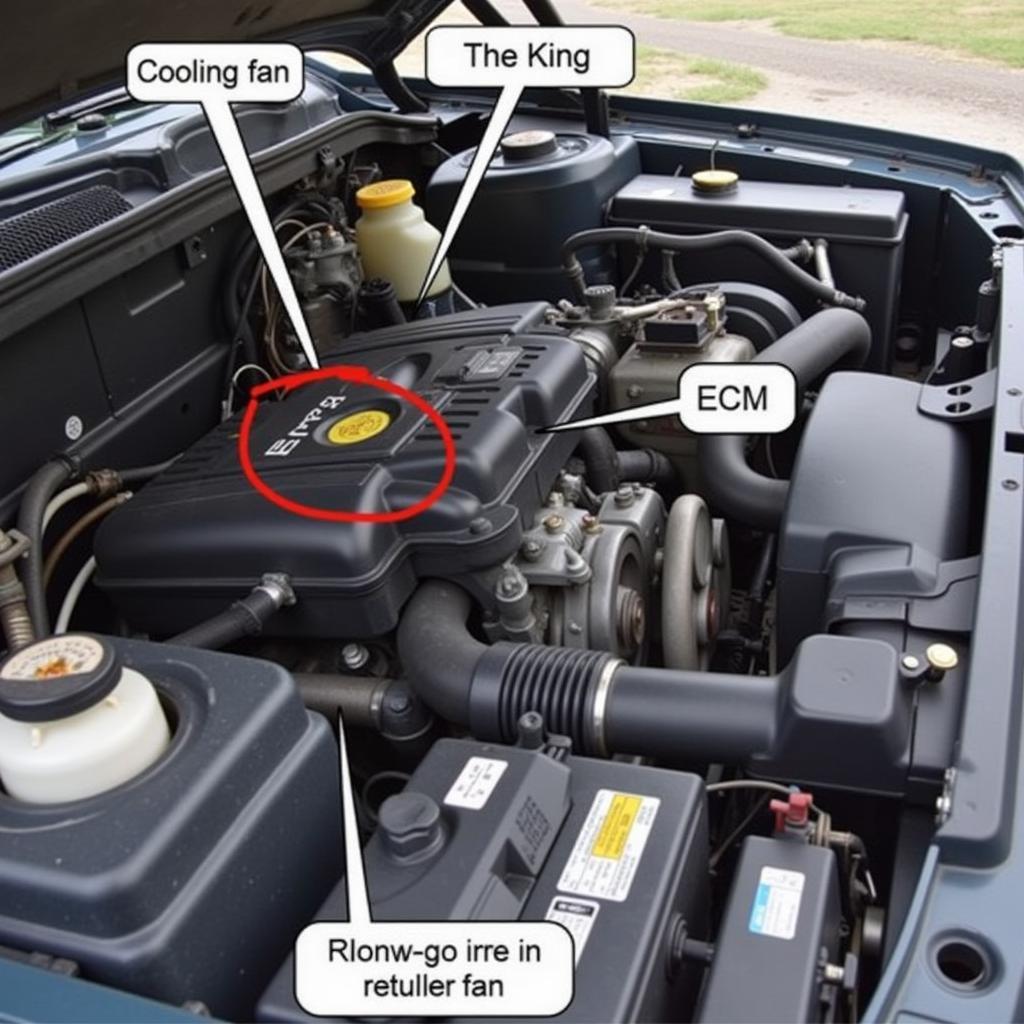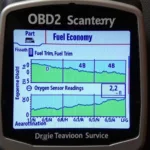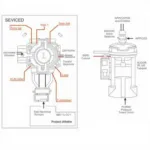The OBD2 code P0481 indicates a problem with your vehicle’s cooling fan rationality check. While it may sound complex, understanding this code and its implications can save you from potentially costly repairs and keep your engine running cool.
This comprehensive guide will delve into the intricacies of the P0481 code, exploring its causes, symptoms, diagnostic procedures, and common solutions. Whether you’re a car enthusiast or simply want to be better informed about your vehicle’s health, read on to become well-versed in everything P0481.
Decoding the P0481 Code: What Does It Mean?
Your car’s engine generates significant heat, and a properly functioning cooling system is crucial to dissipate this heat and prevent overheating. A key component of this system is the cooling fan, responsible for drawing air through the radiator to regulate the engine’s temperature.
The P0481 code specifically points to an issue with the cooling fan’s rationality check. This check, performed by your car’s Engine Control Module (ECM), ensures that the cooling fan’s operation aligns with the engine’s temperature readings.
When the ECM detects an inconsistency—such as the fan not engaging when the engine is hot or running at an illogical speed—it triggers the P0481 code. This code signals that the ECM perceives an irrational operation of the cooling fan, even if the fan itself appears to be working.
Recognizing the Symptoms: How to Tell if Your Car Has a P0481 Code
While the appearance of the check engine light is a universal indicator of trouble, other symptoms can help you pinpoint the P0481 code:
- Engine Overheating: The most obvious sign, an overheating engine, can manifest as a temperature gauge reading high or steam emanating from under the hood.
- Erratic Fan Behavior: You might notice the cooling fan operating erratically—running constantly, not engaging when needed, or operating at an unusual speed.
- Air Conditioning Malfunction: In some vehicles, the cooling fan plays a role in the AC system. A malfunctioning fan can lead to poor or no AC performance.
Unraveling the Causes: What Can Trigger a P0481 Code?
The P0481 code can stem from a variety of issues, ranging from simple electrical glitches to more complex mechanical failures. Here are some of the most common culprits:
- Faulty Cooling Fan Motor: A malfunctioning fan motor is a frequent cause, preventing the fan from spinning properly even when commanded by the ECM.
- Defective Cooling Fan Relay: The cooling fan relay acts as a switch, controlling the power supplied to the fan motor. A faulty relay can disrupt this power flow, hindering the fan’s operation.
- Cooling Fan Control Module Issues: Some vehicles utilize a dedicated control module for the cooling fan. Problems within this module can directly impact the fan’s behavior.
- Wiring Problems: Damaged, corroded, or loose wiring within the cooling fan circuit can disrupt communication between the fan and the ECM.
- Faulty Coolant Temperature Sensor: The ECM relies on the coolant temperature sensor to determine the engine’s temperature and regulate the cooling fan. A faulty sensor can send incorrect readings, leading to inappropriate fan operation.
- ECM Malfunction: While less common, a malfunction within the ECM itself can disrupt its ability to control the cooling fan properly.
Diagnosing the Problem: Steps to Pinpoint the Root Cause
Accurately diagnosing the root cause of the P0481 code is essential for effective repair. Here’s a step-by-step approach:
- Retrieve the Code: Begin by connecting an OBD2 scanner to your vehicle’s diagnostic port and retrieving the stored trouble codes. The presence of P0481 confirms the issue.
- Visually Inspect the Cooling Fan: Conduct a visual inspection of the cooling fan and its wiring. Look for any signs of physical damage, loose connections, or corrosion.
- Test the Cooling Fan Relay: Locate the cooling fan relay and test its functionality. This can often be done by swapping it with a known-good relay.
- Check the Coolant Temperature Sensor: Test the coolant temperature sensor to ensure it’s sending accurate readings to the ECM.
- Inspect Wiring and Connectors: Thoroughly inspect the wiring and connectors within the cooling fan circuit for any signs of damage, looseness, or corrosion.
- Test the Cooling Fan Motor: If other components check out, directly test the cooling fan motor to determine if it’s receiving power and operating correctly.
Addressing the Issue: Common Solutions for the P0481 Code
Once you’ve diagnosed the underlying cause of the P0481 code, addressing it is essential to restore your cooling system’s functionality and prevent engine damage. Here are some common solutions:
- Replace the Cooling Fan Motor: A faulty fan motor typically requires replacement with a new one.
- Replace the Cooling Fan Relay: If the relay is found to be defective, replacing it with a new one is a straightforward solution.
- Repair or Replace Wiring: Damaged or corroded wiring should be repaired or replaced to ensure proper signal transmission.
- Replace the Coolant Temperature Sensor: A faulty coolant temperature sensor needs to be replaced to provide accurate engine temperature readings.
- Address ECM Issues: If the ECM is diagnosed as faulty, it might require reprogramming or replacement. Consulting a qualified mechanic is crucial in this case.
Expert Insights
From the Workshop of John Miller, ASE Certified Master Technician:
“I often see car owners neglecting their cooling systems, which can lead to issues like the P0481 code. Regular maintenance, such as checking coolant levels and inspecting the cooling fan, can prevent many problems down the road. Additionally, using a high-quality OBD2 scanner for early diagnosis is key to avoiding costly repairs.”
A Word from Sarah Thompson, Automotive Engineer:
“Modern vehicles heavily rely on sensors and modules for optimal performance. The cooling fan rationality check is a prime example of this. Understanding how these systems interact is crucial for effective troubleshooting and repair. Don’t hesitate to seek professional help if you’re unsure about any aspect of your vehicle’s cooling system.”
Conclusion: Keeping Your Engine Cool and Your Mind at Ease
The P0481 code, while potentially signaling a serious issue, is often resolvable with timely diagnosis and repair. By understanding its causes, symptoms, and solutions, you can take proactive steps to ensure your vehicle’s cooling system remains in top condition, preventing potential engine damage and costly repairs. Remember, a well-maintained vehicle is a happy vehicle!
Frequently Asked Questions:
- Can I still drive my car with a P0481 code? It’s not advisable to drive your car with a P0481 code, as it indicates a potential issue with the cooling system that could lead to overheating and engine damage.
- How much does it cost to fix a P0481 code? The repair cost can vary greatly depending on the underlying cause. Simple fixes like replacing a relay can be inexpensive, while more complex repairs involving the fan motor or ECM can be more costly.
- Can I fix a P0481 code myself? If you’re comfortable with basic car maintenance, you might be able to handle simple fixes like replacing a relay or sensor. However, more complex issues might require professional assistance.
- How often should I check my coolant levels? It’s a good practice to check your coolant levels at least once a month.
- What is the difference between the P0480 and P0481 codes? While both codes relate to the cooling fan control circuit, P0480 typically indicates a general electrical fault, while P0481 specifically points to an issue with the fan’s rationality check.
Need More Help?
For further assistance in diagnosing and resolving your car troubles, feel free to reach out to our team of experts. We’re available 24/7 to answer your questions and provide guidance. Contact us via WhatsApp at +1(641)206-8880 or email us at [email protected]. You can also find more helpful articles and resources on our website, OBDFree.com.


